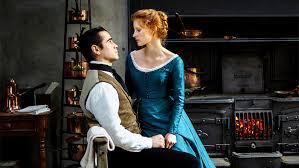"We are all forced to face ourselves as less than we'd hoped to be."
Liv Ullman gives August Strindberg's most famous play respectful but not especially cinematic treatment. Miss Julie (2014) serves best as an acting showcase for its cast, especially Jessica Chastain, who relishes the chance to play a classic role.Ullman (who directed and wrote the script) relocates Strindberg's tale from 1890s Sweden to Ireland. Julie (Jessica Chastain), daughter of an Anglo-Irish count, carries on an awkward flirtation with her valet John (Colin Farrell). John initially resists her advances, until he forcefully consummates their relationship. John tries persuading Julie to elope with him, but Julie's reluctant, worrying about lack of money and damage to her social standing. John's fiancee, cook Kathleen (Samantha Morton) adds a further spanner to the works when she refuses to take Julie's mischief lying down.
The big problem with Strindberg's plays is their abject bleakness, their fin de sicle musings on human decay so exaggerated they nearly verge on parody. Works like Miss Julie and The Father relish trapping their protagonists in insoluble situations, driven mad by scheming servants and monstrous family members. Even worse if the protagonist is a woman, whom Strindberg invariably depicts as either neurotic weaklings or manipulative monsters. On his worst days, John Osborne (who once adapted Miss Julie himself) was a ray of feminist sunshine compared to Strindberg.
Ullman pares down the cast to its three leads and adds a prologue, but otherwise sticking to Strindberg's text. Julie remains a wishy-washy character, who arbitrarily evokes her noble standing to bend Jean to her whims while playing up her uncommon familiarity with commoners. How could hot-blooded John, or any mere man, resist such a creature? After bedding her, John turns tables, becoming a monstrous figure who whipsaws between affection and scorn, mocking his master's behavior: where Julie forces Kathleen to abort a dog's mixed-breed puppies, John destroys her beloved canary. Kathleen's appeals to morality and affection exacerbate the mess, trapping John and destroying Julie.
Handsomely mounted, Miss Julie nonetheless never really transcends its stage origins. Photographer Mikhail Krichman emphasizes the protagonists' isolation, with a central image of Julie and John skulking through the long, dim corridors of a wine cellar, or prowling the monochrome manor (occasionally interrupted by forested exteriors). While Ulman's direction offers splashes of poetry (a beautifully framed shot of Julie staggering down that endless corridor, a flower-on-stream finale evoking Hamlet) and a rich classical score featuring Schubert, Chopin and other standards, the movie's only intermittently cinematic, relying on the material and actors to make it sing.
The cast does yeoman's work, with full-throated histrionics befitting a stage adaptation. Jessica Chastain works to find sympathy within Julie's hysterical contours, emphasizing her psychological scars through affected playfulness and trembling insecurity. It's an impassioned performance that makes us sympathize with a very problematic heroine. Colin Farrell acts in high fettle, bristling beneath his mistress's control than relishing his newfound power. Samantha Morton, by contrast, is amiably subdued, affecting in her despair and long-suffering incomprehension.
No doubt this writer's prejudice against Strindberg colored my view of Miss Julie: I studied his work in school and never took to his insistence that life's mad and bad and that bitches, in particular, be crazy. Praise to Liv Ullman and her cast for finding humanity within this troubled work, even if they don't overcome its limitations.


